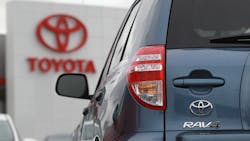Toyota Must Spend to Win in Brave New World of Autos: Viewpoint
From the way it talks about itself, you could be forgiven for missing the fact that Toyota (IW 1000/8) is on the verge of becoming the world’s third-biggest publicly traded company by sales.
Amid fears about the hit to profit from a stronger yen, the carmaker is switching off elevators in its main Tokyo office and cutting back on air-conditioning and bathroom hand-driers, according to Bloomberg’s Craig Trudell and Yuki Hagiwara. Currency weakness in recent years “helped raise our earnings above the level of our true capabilities,” President Akio Toyoda moped at a news conference after annual results in May.
Such parsimony might seem like a worthy dose of realism for a business in dire straits. Toyota is anything but.
True, first-quarter net income reported on August 4 fell 15% from a year earlier, and is forecast to remain down through the current year ending in March.
But at $19.3 billion, last year’s profit was only a little less than the $20.4 billion racked up by Fiat Chrysler, Mitsubishi, Suzuki, Peugeot, Mazda, Kia, Honda, Renault, Subaru and Nissan put together.
Toyota’s operating margin over the past three years has averaged 9.7%, the fourth-best among carmakers globally with at least $10 billion in annual sales. In the past 60 quarters, it’s posted just three losses, all during the 2008-2009 financial crisis.
That’s worth remembering, because right now the dangers of inaction for Toyota are at least as great as the risks from seizing the day.
Changing Landscape
The auto industry is on the brink of some of its biggest changes since the invention of the internal combustion engine. Global electric vehicle sales increased by 49% in the March quarter of this year relative to a year earlier, according to Bloomberg New Energy Finance. In China, electric and hybrid vehicle sales were up 181% over the same period, the data show.
Autonomous cars are just around the corner, too. Untroubled by the (often prudent) self-doubt of Toyota, Tesla is already offering cars with highway self-driving capabilities. Its latest vision of the promised land says prototype self-driving trucks and buses will be unveiled within a year. Even a more sober rival like Ford thinks the first fully autonomous cars could be on the roads by 2020, according to CEO Mark Fields.
And don’t forget ride-sharing, which has already transferred billions from venture capitalists into the pockets of hard-up drivers and has just seen its first grand bargain after Uber (in which Toyota bought a stake in May) buried the hatchet with Chinese rival Didi Chuxing.Rolling out all of those changes in the coming years is going to be phenomenally expensive.
But big auto has become so distracted by scandals over occasionally lethal Takata airbags and faulty fuel-efficiency testing that it’s short-changing its own future. Research and development spending by the big U.S., German and Japanese carmakers fell last year for the first time since 2009, according to data compiled by Bloomberg.
Toyota is no exception. Trailing 12-month R&D dropped 0.6% in the March quarter, the first such decline in three years. Capital expenditure slumped 3.6%, the sharpest fall since June 2010, according to Gadfly’s calculations.
Toyota likes to ensure that the two categories of spending are covered by its operating cash flows, but it’s being exceptionally conservative: Such outlays amounted to just 43% of operating cash in the March quarter, the lowest level since at least 2008.
A further 20 billion yen will be cut from forecast 2017 R&D and capex, Toyota said Thursday. The result should leave those numbers positive over the 12 months, but growing at the slowest pace in years -- just when Toyota should be using its size and profitability to win an edge over the competition.
While the stronger yen and slump in the share price have prompted some jitters, the company should be wary of losing heart.
Volkswagen, which has long sought to take Toyota’s crown as the world’s largest carmaker and spends about 70% more on R&D, drew a line under its diesel problems with a $15.3 billion settlement in June and beat its Japanese rival for first-half global sales for the second year running.
Toyota needs to perk itself up and start fighting. The only thing it has to fear is fear itself.
By David Fickling
